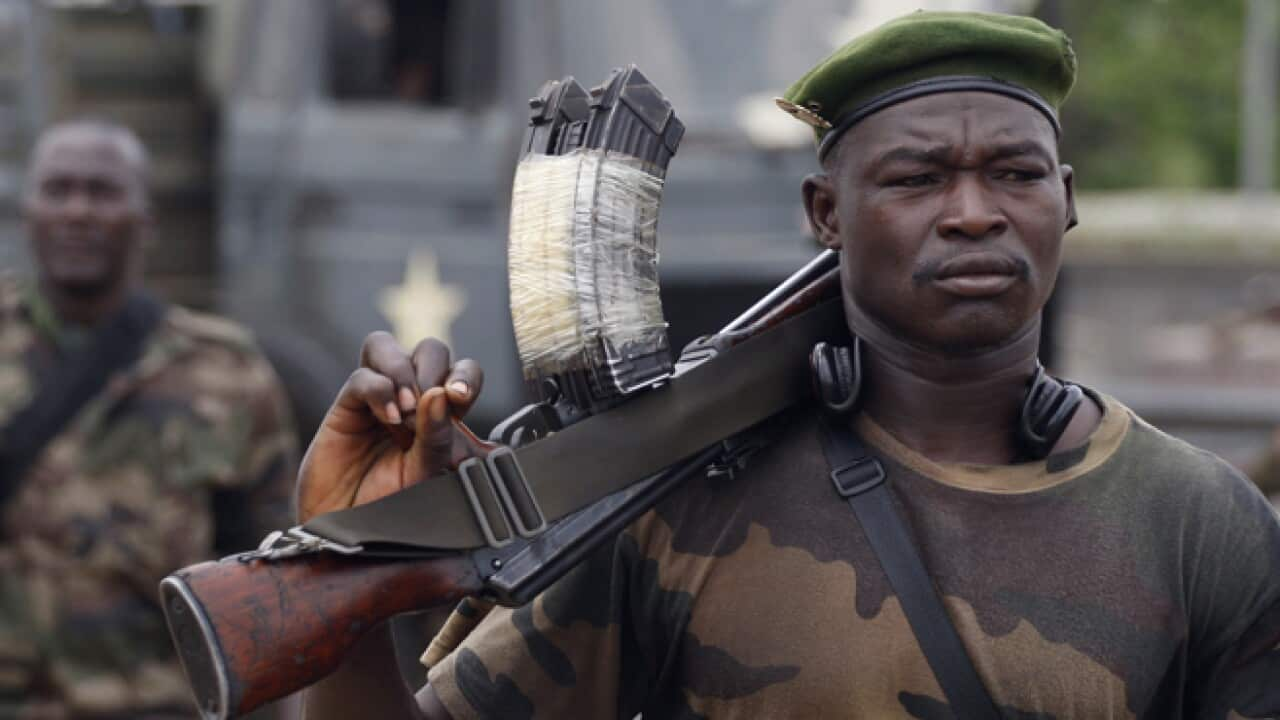Heavy weapons fire erupted in Ivory Coast's Abidjan Thursday after Japan's ambassador was rescued overnight from fierce battles involving fighters for would-be president Alassane Ouattara.
Former colonial power France, militarily involved, predicted that defeated President Laurent Gbagbo's fall was inevitable.
Gunfire was heard around the presidential palace and the residence of Gbagbo, who refuses to cede power to his rival after disputed elections in November.
France said Gbagbo had "less than 1,000 men" in the main city Abidjan, including around 200 at his residence, where he was holed up.
Forces for Ouattara, the internationally recognised president, tried to enter the residence Wednesday to remove him but failed and had to pull back after clashes.
Ambassador's home surrounded
However the home of Japanese ambassador Yoshifumi Okamura's was surrounded as Ouattara's fighters used the building as a launching point for rockets and cannon, forcing the ambassador and a dozen people to hide behind a bulletproof door.
Okamura and his aides were eventually evacuated by French helicopters and taken to a French military camp at Port-Bouet, south of Abidjan, the French embassy said.
"Thanks to help by the French military and the United Nations, the ambassador was rescued with seven others," an official at the foreign ministry in Tokyo told AFP.
Israel has also asked French forces to extract its diplomats from the conflict-torn city, French Foreign Minister Alain Juppe said on Thursday.
Juppe said Gbagbo's departure was inevitable, although he could not say if it was a matter of hours or days.
"Today, at the moment, former president Gbagbo's forces are reportedly a bit less than 1,000, including 200 at his residence," French Defence Minister Gerard Longuet said separately.
Outtara's forces 'pull back'
A resident near Gbagbo's residence told AFP Ouattara's Republican Forces army had to pull back from the compound Wednesday after several hours of sustained heavy weapons fire.
"The Republican Forces arrived up to 150 metres (164 yards) from the gate. They had to pull back," he added.
The offensive launched by Ouattara's troops "met with strong resistance from Gbagbo's last loyal men", a French government source told AFP.
"There are still some mortars and tanks in the presidential compound, the offensive was suspended for a few hours," the source said.
Ouattara's camp earlier said they were going to storm the bunker and forcibly remove Gbagbo to end his decade-long rule of the world's number one cocoa producer after losing November elections.
In France a government source said Ouattara forces had launched a final assault after negotiations to persuade Gbagbo to give up power failed.
"Gbagbo was still refusing to sign a document recognising Ouattara's victory ... and Ouattara concluded that he was not being honest," the source said.
"He therefore decided to intervene militarily to try to resolve the problem, to capture Gbagbo alive."
Gbagbo's camp condemned the move as an "assassination attempt".
Gbagbo in contact
UN peacekeeping department spokesman Nick Birnback told AFP Gbagbo remained in contact with international representatives.
"Discussions continue with the UN using its good offices to the fullest extent possible," he said.
After calling for a ceasefire and retreating to the bunker Tuesday with his wife Simone and a few others, Gbagbo insisted in a radio interview late Tuesday he would not accept he had lost the vote.
"I do not recognise the victory of Ouattara... Why would you want me to sign this?" Gbagbo told France's LCI news channel, referring to the document in which France and the United Nations urge him to quit.
Gbagbo also said that while he did not regard himself as a "martyr", he was prepared to die. "If death comes, it comes," he said.
Concern grew at claims of massacres over the past week when Ouattara's army mounted a lightning offensive into areas held by Gbagbo forces, capturing several towns on the way to the main city, Abidjan.
The United Nations said it believed "several hundred civilians" were killed in the western town of Duekoue and one mass grave had almost 200 bodies.
The prosecutor of the International Criminal Court, Luis Moreno-Ocampo, announced he was collecting information on the allegations and planned a formal investigation.
Several hundred people have been killed in violence linked to the months-long presidential standoff, while up to a million had fled their homes to escape clashes, according to UN agencies.
The European Union imposed new sanctions on Gbagbo, banning the purchase of bonds from his "illegitimate government".
Gbagbo was elected in 2000 and postponed polls due in 2005 several times before allowing them to go ahead last year, only to reject the result issued by the election authority and backed by the United Nations.
Share

